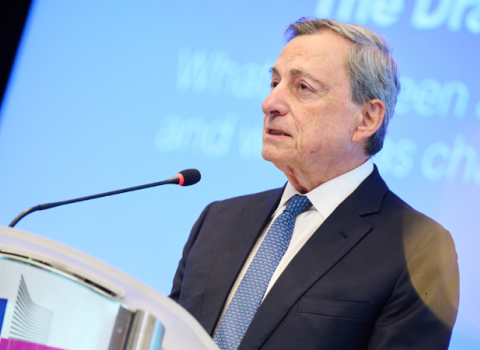A Dutch candidate for the European Parliament lays out the case for an expanded EU investment in Framework Programme 10

Ronald de Bruin, Director of COST- European Cooperation in Science & Technology, and candidate for the European Parliament.
Millions of voters are heading to the polls this week for the European elections. Not surprisingly, most of the campaigning is dominated by hot-button issues like migration, climate change and security. But there is little attention paid to what I regard as hugely important: research and innovation.
I find this strange. Research and innovation, high technology and digital transformation – all are vital for our future. Besides, there’s a lot of money involved. With its €95.5 billion budget, the EU’s Framework Programme for Research and Innovation (Horizon Europe) is the third largest line in the EU budget, after agriculture and structural funds, and the biggest budget implemented by the European Commission directly.
Not surprisingly, countries are very reluctant to increase their contribution to the EU budget. And some (northern countries in particular) are dead against the EU creating debt to increase the EU budget. This means that, while the budget for the next research and innovation programme (FP10) should provide the means to help meet the increasing challenges that are high on the policy agenda, we may just end up with a modest inflation correction for FP10 compared to Horizon Europe.
As a European Parliament candidate for a Dutch political party, New Social Contract, I think we need to reframe the R&I narrative.
Investment, not budget
Ministers in national governments who are responsible for research and innovation too often fight an uphill battle against their ministers of finance in making the case for budget. This begs the question how we can come to a convincing line of argument that resonates with finance ministers. So, let’s agree that from now on we will talk about investments, rather than budget, to deliver added value to our economies, societies and democracies.
More and more major challenges are facing us that we as a (knowledge) society must find an answer to. This includes climate change, increasing environmental pollution (soil, water and air), the impact of demographic changes on medical care, damage to the security and reliability of our digital environment, and the dependence on third countries for raw materials and technologies in times of geopolitical tensions, to name a few.
To meet these and other challenges, strengthening investments in research and innovation are essential. Ultimately, this creates prosperity and jobs, which contributes to the security of our livelihoods, makes our industry more competitive, and makes us less dependent on non-likeminded countries outside Europe. And don’t forget that the costs of inaction are far bigger. We need a strong European industry to defend our prosperity, freedom and democracy. But Europe’s share in global industry keeps declining (from 25% in 2020 to 16.3% now, while US firms are 20% more profitable).
Now, let’s do the maths for a frugal country like the Netherlands, which contributes more to the EU budget than it receives. With its open economy heavily dependent on trade, the Netherlands has a simple calculation to make: one euro of investment (note the reframing here) into the EU budget delivers 10 euros in return to the entire Dutch economy. Dear Minister of Finance, are we going to kill the goose that lays the golden egg? I am sure a positive return on investment is achieved for all the net payers, and others as well. Investment in research and innovation creates a huge leverage factor.
And, dear Minister of Finance, we need big investments. Big investments require stability. But the EU research and innovation programmes are often the victims when money has to be found for acute problems. Consider the Juncker Plan (2019) or the recent cut of more than €2 billion in the current Framework Programme. Members of the European Parliament have urged a budget of €200 billion for FP10, and demanded it be ringfenced. Even though that seems very ambitious, the Framework Programme must be protected from being used as a grab bag. The question then remains whether defence research should be financed by FP10 – and, if so, whether additional budget will be allocated. In my opinion, cannibalisation is best prevented by keeping both instruments separate.
How to create more value
Although FP10 will not start until 2028, the European Commission is already outlining the contours of a comprehensive proposal that will see the light of day in 2025. It is then up to the European Parliament and the Council as co-legislators to take the proposal further. Indeed, we need to step up investments in research and innovation to solve big societal problems, strengthen Europe’s competitiveness, and ensure Europe’s strategic autonomy. To meet the challenges, we must double the FP10 budget to €200 billion.
Of course, with that money, much must be done. Roadmaps should be developed to drive big public-private investments aimed at increasing Europe’s competitiveness. To guarantee Europe’s strategic autonomy, we not only must de-risk our technology relations with other countries, but we must also build on our strengths to excel so that others need us more than we need them in key industrial and technology areas. We must strengthen those parts of the programme proven to work, and dare to stop those that do not deliver sufficient added value. We must continue investing in the eco-system that nurtures the European Research Area (ERA) for knowledge and researchers to circulate freely. The programme should aim at catapulting less research-intensive countries into mainstream funding.And last, but not least, overlap must be avoided and synergies must be created as much as possible between FP10 and other funds that include a (modest) part of research and innovation.
The to-do list is long, of course. But, by focusing today on the best use of our science and technology investments, we can make a difference for Europe’s future.
Ronald de Bruin is Director of COST- European Cooperation in Science & Technology, and a candidate for the European Parliament.





 A unique international forum for public research organisations and companies to connect their external engagement with strategic interests around their R&D system.
A unique international forum for public research organisations and companies to connect their external engagement with strategic interests around their R&D system.